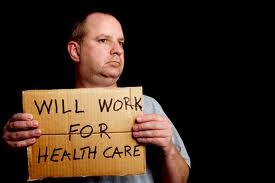By Sheldon Greaves
 Last year, despite hysterical warnings from critics that it would cause seniors to “die sooner†and usher in a “government takeover†of the health care industry, Congress passed and the President signed the Patient Protection and Affordable Care Act to the literal relief of millions of Americans. The GOP-controlled House will now go to work trying to dismantle the bill by defunding important provisions and otherwise working attentively to deny care to more and more Americans. Meanwhile, the debate over health care reform continues. Opponents of the bill continue to marshal a cacophony of excuses and complaints against the radical proposition that, as a nation, we would be better off it we took care of each other.
Last year, despite hysterical warnings from critics that it would cause seniors to “die sooner†and usher in a “government takeover†of the health care industry, Congress passed and the President signed the Patient Protection and Affordable Care Act to the literal relief of millions of Americans. The GOP-controlled House will now go to work trying to dismantle the bill by defunding important provisions and otherwise working attentively to deny care to more and more Americans. Meanwhile, the debate over health care reform continues. Opponents of the bill continue to marshal a cacophony of excuses and complaints against the radical proposition that, as a nation, we would be better off it we took care of each other.
Lost in the clamor of this debate is any meaningful discussion of what the lack of health insurance means to the unemployed or the severely underemployed. The problem is easily summarized; if you or a loved one can’t afford health insurance, an illness– whether serious or moderate–is a grave urgency. Prior to the passage of the Patient Protection and Affordable Care Act, some 45,000 Americans died each year from preventable causes because they could not afford health care. The Centers for Disease Control reported[1] in November of last year that 59 million Americans went without health insurance for at least part of 2010. Even today, more than a year after the reforms, more Americans than ever cannot afford health insurance. Assuming health care reform isn’t rendered ineffective, it will help many of these obtain insurance. But the Patient Protection and Affordable Care Act will not cover everyone; if you don’t have a job or don’t have enough money, your prospects are still bleak if you face a serious illness.
When you lose your job, you have to replace lost resources by improvising. Many options exist for essentials such as food and shelter. One can obtain food at low-cost grocery outlets, government programs, food banks, churches, and through the kindness of friends. People watch for sales, clip coupons, grow gardens or, as a last resort, scrounge. Although the spreading blight of malnutrition is a serious problem and a national disgrace, the number of people who starve to death in the United States is small. Options likewise exist for those who lose their homes; they can downsize, move in with family, or double up with friends. Homeless shelters exist as a last resort. Relatively few American poor die of exposure, although even one is too many.
Health care is different. In many situations, no amount of cleverness or commitment to self-sufficiency will see you through. Compare the small number of people who die of starvation and exposure with the tens of thousands who yearly succumb to curable diseases because they lack access to health care, and the millions who are bankrupt because of medical bills. These numbers show that if you have a problem that can’t be solved with over-the-counter drugs or the limited services of a free clinic, your options are bankruptcy or death—possibly both. With the Bureau of Labor Statistics U6[2] unemployment statistic at a dubious 15.6% (the actual figure is probably higher), for the sake of our fellow citizens, America must demand stronger health care reform, by instituting a single payer system or–at least–a robust public option. The lives of tens of thousands of our fellow Americans are at stake.
References:
[1] http://www.reuters.com/article/2010/11/10/us-usa-healthcare-insurance-idUSTRE6A905U20101110
[2] http://www.bls.gov/news.release/empsit.t15.htm

